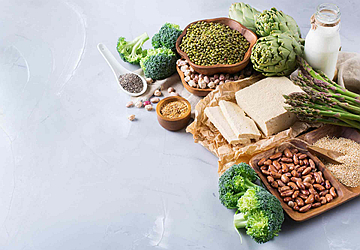In today's evolving world of nutrition and diet, an increasing number of people are leaning towards healthier, more sustainable options for their daily protein intake. Whether motivated by ethical concerns, health reasons, or environmental consciousness, plant-based protein sources are seeing a rise in popularity. This article explores various vegan protein options and meat alternatives, shedding light on complete protein plants that can effectively replace conventional meat-based products in our diets.
There are numerous reasons why individuals are turning towards plant-based diets. From reducing carbon footprints to promoting cardiovascular health, the reasons are multifaceted. With the looming threat of global warming, consuming meat alternatives made from plants can significantly reduce the environmental impact compared to traditional livestock farming. Health-conscious individuals also prefer vegan diets, given the plethora of benefits, including reduced risk of chronic diseases.

Quinoa: Often referred to as a superfood, quinoa is among the few plants that offer a complete protein profile. This means it contains all the essential amino acids your body requires. With its nutty flavor and versatility, quinoa can be incorporated into salads, soups, and even desserts.
Lentils: A staple in many cuisines around the world, lentils are a rich source of protein and fiber. Whether you prefer them in stews, curries, or salads, they're a delightful addition to any dish.
Tofu and Tempeh: Both tofu and tempeh are soy-based vegan protein options that have been popular in Asian cuisine for centuries. While tofu is made from coagulated soy milk, tempeh is a fermented product. Both can be marinated, fried, or grilled, serving as a perfect meat substitute in various dishes.
Edamame: These are young, green soybeans and are delectable when boiled or steamed. Rich in protein, they can be consumed as a snack or added to salads and stir-fries.
Seitan: Wheat gluten, sometimes referred to as seitan, is a protein-rich alternative to meat. It is a preferred option for veggie-based "meats" in curry dishes, hamburgers, and curries because of its crumbly consistency and capacity to soak up flavors.
Chia Seeds: These tiny seeds pack a powerful protein punch. They can be sprinkled over smoothies, oatmeal, or yogurt, making for a protein-rich topping.
Today, a variety of meat alternatives are available in the market. Brands are now producing burgers, sausages, and even steaks using plant-based ingredients. The main advantage is that these products mimic the texture and taste of meat while being entirely plant-derived. Ingredients like jackfruit, seitan, and mushrooms are used to create these meaty textures. Moreover, advancements in food technology have made it possible to produce vegan meats that even 'bleed' like their meat counterparts, all thanks to ingredients like beet juice.
One common concern about plant-based diets is the intake of complete protein plants. Unlike animal sources, not all plants provide all the essential amino acids. However, if we combine various plant sources, we can very easily achieve a balanced amino acid profile. Necessary for our diet... For instance, combining rice and beans or hummus and whole-grain bread can provide a complete protein source.
● Carbon Footprint: Livestock farming produces a significant amount of greenhouse gases.bastically reduce emissions, making a positive impact on our planet.
● Land and Water Usage: Raising animals requires vast amounts of land and water. Plant-based crops, especially when compared weight for weight in protein, generally use fewer resources.
● Biodiversity: Over-farming leads to habitat destruction. A shift towards sustainable plant-based protein sources can help maintain ecosystem balance.
● Animal Welfare: By choosing vegan protein options, you're advocating for fewer animals to be raised in often harsh conditions in industrial farms.
● Fair Trade: Many plant-based protein sources can be grown in various parts of the world, promoting fair trade practices and supporting small-scale farmers.
● Smoothies: Blend spinach, chia seeds, almond milk, and your choice of fruit for a protein-packed start.
● Oatmeal: Add hemp seeds, flax seeds, and almond butter for a twist on the traditional oatmeal.
● Vegan Wraps: Use chickpea flour to make savory wraps, and fill them with grilled tempeh, fresh veggies, and tahini sauce.
● Stir-Fries: Toss tofu or edamame with your favorite vegetables, and season with tamari and ginger for a hearty meal.
● Roasted Chickpeas: These offer a crunchy, protein-rich snack. Season as per your preference.
● Nut and Seed Mix: Combine almonds, pumpkin seeds, and sunflower seeds for a quick protein boost.
Myth 1: You can't get enough protein from plants.
● Fact: Many plants are rich in protein. By diversifying your diet and understanding combinations, you can meet your daily protein requirements easily.
Myth 2: Vegan diets are expensive.
● Fact: While some specialty items can be pricey, staple vegan protein options like lentils, beans, and grains are often more affordable than meat.
Myth 3: Vegan diets are bland and restrictive.
● Fact: With a plethora of grains, legumes, veggies, fruits, nuts, and seeds available, vegan diets can be incredibly diverse and flavorful.
As technological innovations continue to shape the food industry, we can expect even more meat alternatives that cater to various palates and preferences. Furthermore, as research unfolds, the undeniable health benefits of a plant-centric diet will likely push more people towards adopting vegan protein options.
Switching to plant-based protein sources doesn't mean you have to compromise on taste, texture, or nutrition. Today, there are ample vegan protein options and meat alternatives that ensure you get the required amount of protein, all while enjoying a diverse range of flavors. With the dual advantage of being environmentally sustainable and promoting better health, it's no wonder that plant-based diets are the future of nutrition. Whether you're fully vegan or simply exploring your options, there's never been a better time to delve into the world of plant-based proteins.